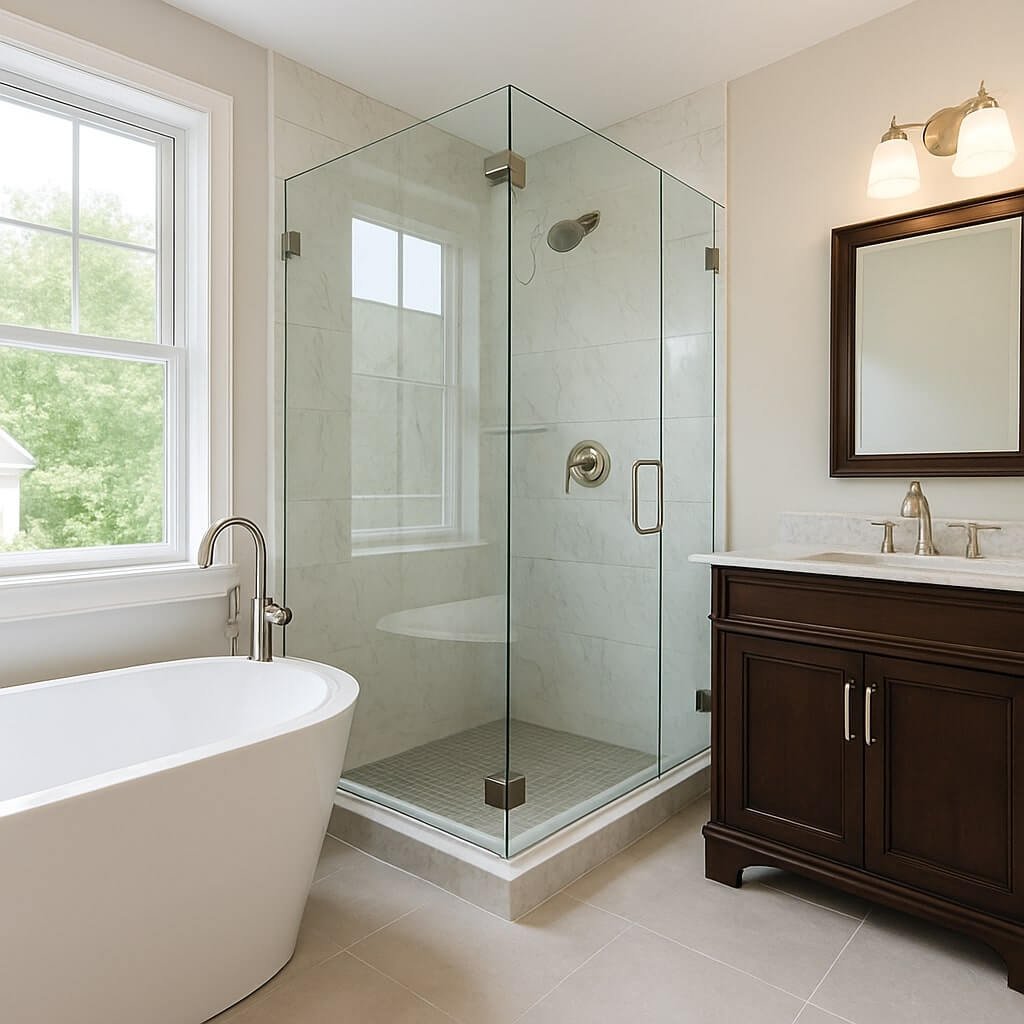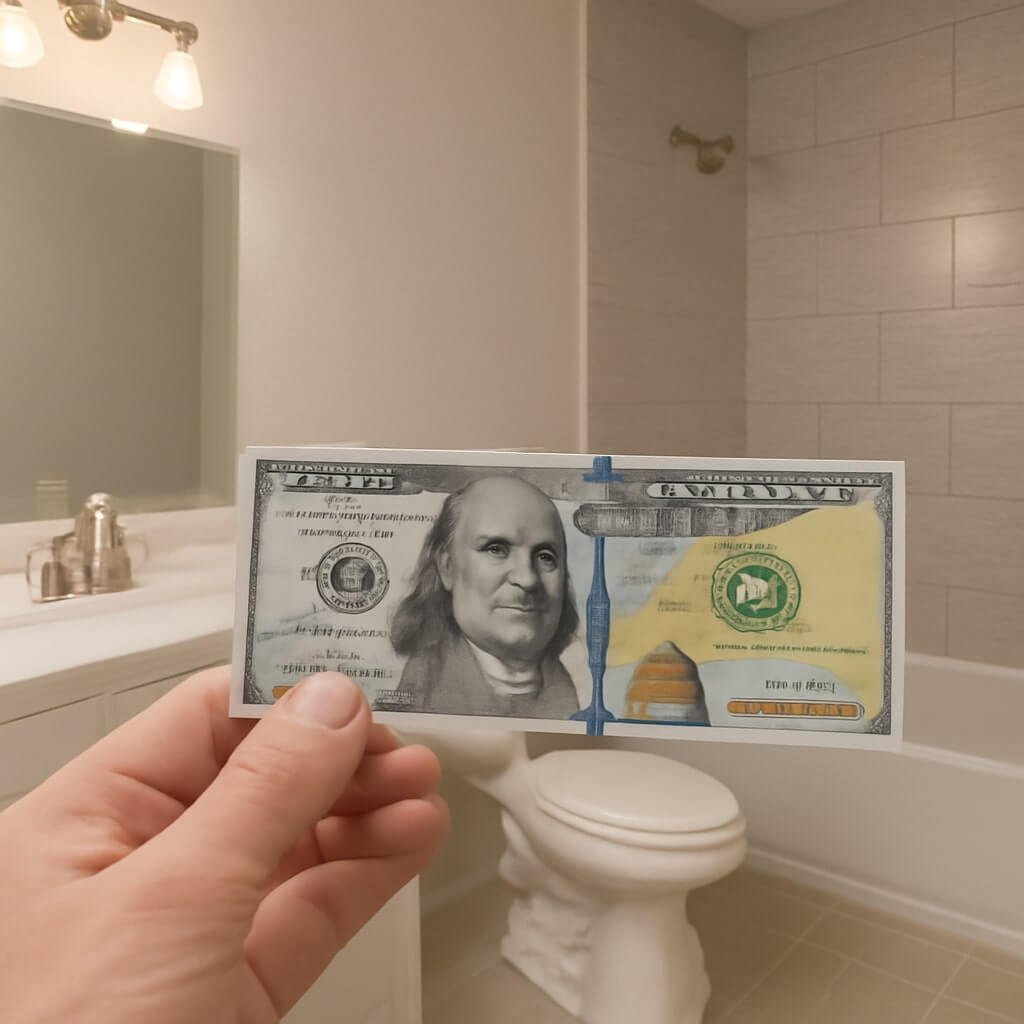When you’re planning a bathroom remodel, one of the biggest costs you’ll face comes from the fixtures. From bathtubs to custom showers, these essentials can vary widely in price based on style and materials. High-end toilets add to the expense, with options that can really stretch your budget. Understanding these costs is vital, especially if you want to maintain a balance between quality and affordability. So, what specific factors should you consider before making a decision?
Key Takeaways
- The most expensive part of a bathroom remodel is typically the bathtub, with prices ranging from $300 to over $5,000 depending on style and features.
- Custom showers can be costly, with expenses varying based on design complexity and material quality, impacting overall budget significantly.
- High-end toilets can range from $1,000 to $5,000, featuring advanced technology and luxury, contributing to remodel costs.
- Installation costs for fixtures like sinks, faucets, and toilets add up, requiring careful budget planning to manage expenses effectively.
- Balancing aesthetics and functionality while considering material choices is crucial to avoid overspending on expensive fixtures during a remodel.
Understanding Bathroom Fixture Costs
When you’re planning a bathroom remodel, understanding fixture costs is essential, as these elements can greatly impact your budget.
Fixtures like sinks, faucets, and toilets vary widely in price based on materials and brand. Investing in high-quality fixtures often pays off regarding durability and style trends, ensuring your bathroom remains fashionable for years.
Don’t forget fixture maintenance costs; some materials may require more upkeep than others. By considering both initial purchase prices and long-term care, you can create a beautiful, functional space that aligns with your budget and aesthetic vision.
Choose wisely to enhance your bathroom’s appeal!
Factors Influencing Fixture Prices
As you explore the world of bathroom fixtures, several factors can greatly influence their prices.
First, fixture brands play a vital role; well-known brands often come with higher price tags due to their reputation for quality and design.
Additionally, material choice markedly impacts costs; premium materials like brass or natural stone usually elevate prices.
Don’t forget to take into account pricing trends in the market—seasonal sales or new product launches can affect what you pay.
Finally, style and customization options can add to the expense, so it’s important to balance your aesthetic preferences with your budget constraints.
Average Costs of Bathtubs
Bathtub prices can vary widely, typically ranging from $300 to over $5,000 depending on various factors.
The cost generally reflects the type of bathtub styles you choose, such as freestanding, alcove, or soaking tubs. Basic models with minimal features are more affordable, while those with luxury features like heated surfaces, whirlpool jets, or custom finishes can greatly increase the price.
You’ll also want to take into account installation costs, which can add to your overall budget.
Ultimately, selecting the right bathtub involves balancing your preferences with your budget, ensuring you get both comfort and style in your bathroom remodel.
Average Costs of Showers
When considering your shower remodel, you’ll find that costs can vary greatly based on the type of shower you choose, such as prefabricated units versus custom builds.
The complexity of the installation can also impact your budget, as some designs require more labor and expertise.
Additionally, the quality of materials you select plays an essential role in determining the overall expense, so it’s important to weigh your options carefully.
Shower Type Variations
Shower types can dramatically influence both the aesthetics and functionality of your bathroom, and understanding their costs is essential for any remodel.
Various shower designs, from traditional alcoves to luxurious walk-ins, come with different price tags. For instance, a prefabricated shower stall might run you around $1,000, while custom tile showers can reach $5,000 or more, depending on the complexity and materials used.
Popular shower materials like ceramic, glass, or stone also impact your budget.
Installation Complexity Factors
Choosing the right shower isn’t just about aesthetics; it also involves understanding the installation complexity that can greatly affect your overall costs.
The installation techniques you choose can vary widely, from simple prefabricated units to custom tile work. More intricate designs often mean higher labor costs and longer project timelines.
Additionally, factors such as plumbing adjustments or structural modifications can increase project complexity, leading to unexpected expenses.
It’s crucial to weigh these aspects against your budget and desired shower style to guarantee a successful remodel.
Ultimately, comprehending these elements will help you make informed decisions during your bathroom renovation.
Material Quality Impact
While considering your shower options, the quality of materials you select plays a significant role in determining costs. Luxury materials, like natural stone or high-end tiles, can elevate your bathroom’s aesthetic but typically come with a steep price tag.
On the other hand, budget materials, such as fiberglass or vinyl, offer a more economical solution without sacrificing functionality. Choosing between these options depends on your overall budget and desired look.
Average Costs of Vanities
When it comes to bathroom remodels, understanding the average costs of vanities is essential for budgeting effectively.
Typically, you’ll find standard vanities ranging from $200 to $1,500, while high-end options can soar above $3,000. Custom cabinetry elevates the price considerably, often adding $1,000 or more, depending on materials and design.
You’ll also want to take into account different vanity styles; freestanding units are generally less expensive than wall-mounted or double-sink options.
Average Costs of Toilets
When you’re considering a toilet for your bathroom remodel, you’ll find a wide range of options to fit different budgets and styles.
Basic toilets can be quite affordable, while high-end models offer luxury features that might catch your eye.
Don’t forget to factor in installation costs, as they can vary greatly depending on the complexity of the job.
Basic Toilet Options
Choosing the right toilet for your bathroom remodel can considerably impact both functionality and aesthetic appeal. You’ll find various toilet styles, each with unique features and price points. Consider eco-friendly options that conserve water while maintaining performance. Here’s a quick comparison of basic toilet options:
| Toilet Style | Average Cost | Features |
|---|---|---|
| Standard Toilet | $200 – $400 | Dual-flush, comfortable |
| Low-Flow Toilet | $150 – $300 | Water-saving, eco-friendly |
| One-Piece Toilet | $300 – $600 | Sleek design, easy to clean |
Invest wisely to enhance your bathroom’s functionality and charm!
High-End Toilets
High-end toilets elevate your bathroom experience with advanced technology and luxurious features. Typically, you’ll find these models ranging from $1,000 to $5,000, depending on the brand and specifications.
Luxury brands like Toto and Kohler offer high-end features such as heated seats, automatic lids, and self-cleaning options, making your daily routine more comfortable and convenient. Additionally, some models come with integrated bidets for enhanced hygiene.
Investing in a high-end toilet not only adds elegance to your bathroom but also improves functionality, turning a simple necessity into a lavish experience. You’ll appreciate the blend of design and performance in these premium options.
Installation Costs
Installing a new toilet, whether it’s a budget-friendly model or a high-end option, involves costs that can vary considerably based on several factors.
Here’s what to take into account:
- Labor Rates: Depending on your location, expect to pay between $50 to $150 per hour for professional installation.
- Installation Techniques: Different toilets may require unique installation methods, affecting both time and cost.
- Additional Materials: Don’t forget to factor in the cost of wax rings, bolts, or new supply lines, which can add $20 to $50 to your total.
Be sure to budget accordingly!
Budgeting for Installation and Labor
While commencing a bathroom remodel, understanding the costs associated with installation and labor is essential for staying within budget.
Labor costs can greatly impact your overall expenses, often accounting for 20-35% of the total project. It’s vital to get multiple quotes and guarantee you’re hiring skilled professionals.
Additionally, consider the installation timelines; delays can lead to increased costs. Efficient scheduling can save you money, so plan ahead and communicate clearly with your contractor.
Tips for Cost-Effective Bathroom Remodeling
To maximize your budget without sacrificing quality, consider these cost-effective bathroom remodeling tips:
- Embrace DIY Strategies: Tackle simple tasks like painting or installing fixtures yourself. This not only saves money but also adds a personal touch.
- Choose Eco-Friendly Options: Look for water-saving faucets and energy-efficient lighting. These choices can lower utility bills and reduce your environmental impact.
- Refurbish Instead of Replace: Instead of buying new cabinets, consider refinishing or repainting them. This can give your bathroom a fresh look at a fraction of the cost.
Conclusion
In summary, when planning your bathroom remodel, it’s essential to be aware of fixture costs and installation expenses. By understanding the average prices for bathtubs, showers, vanities, and toilets, you can set a realistic budget. Don’t forget to factor in labor costs, which can greatly impact your overall spending. With careful planning and research, you can create a stunning bathroom that aligns with your style and budget without breaking the bank. Happy remodeling!




